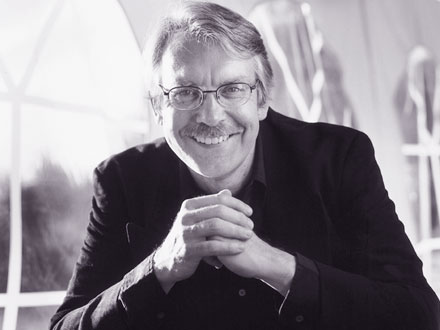

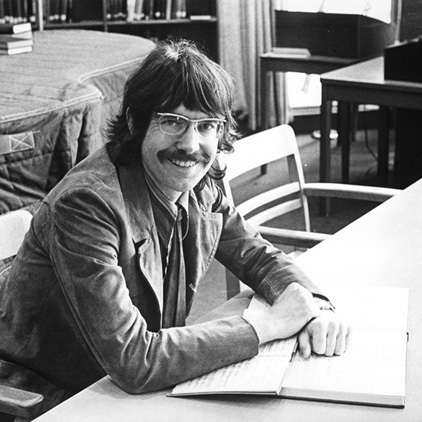 BD: You're looking at it
from the blank page, whereas we, the audience, think about it as the
page already being filled.
BD: You're looking at it
from the blank page, whereas we, the audience, think about it as the
page already being filled.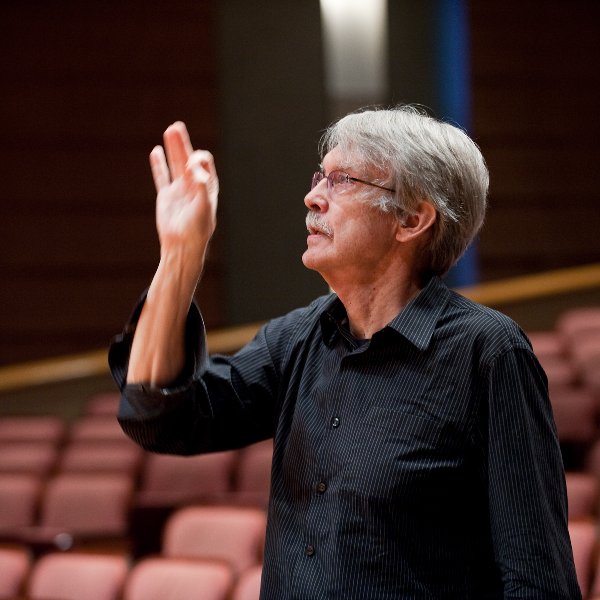 JH: I think we have to
deal with what we've got, which is that if people start by seeing in
some reasonably elegant and unexaggerated way, we have to find ways
that the seeing can lead them into the music. I've begun to think
that the choreography of performance, which in many cases has been
adjusted in concert music to correspond to that of rock, is a
disastrous mistake. The choreography of performance can help
people to hear. The way players communicate with each other
— the interest that they show that communicates
into a physical movement — is
a very important part of what we do. It ought to be considered
more carefully as we teach players.
JH: I think we have to
deal with what we've got, which is that if people start by seeing in
some reasonably elegant and unexaggerated way, we have to find ways
that the seeing can lead them into the music. I've begun to think
that the choreography of performance, which in many cases has been
adjusted in concert music to correspond to that of rock, is a
disastrous mistake. The choreography of performance can help
people to hear. The way players communicate with each other
— the interest that they show that communicates
into a physical movement — is
a very important part of what we do. It ought to be considered
more carefully as we teach players.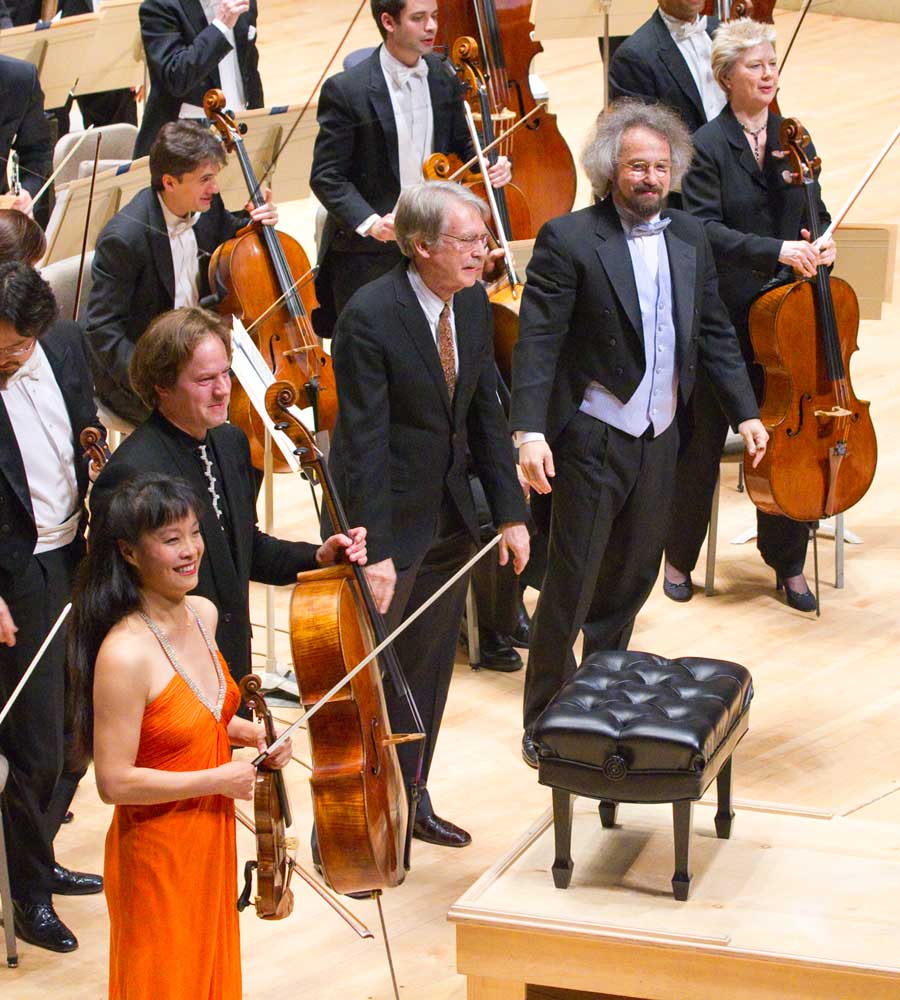
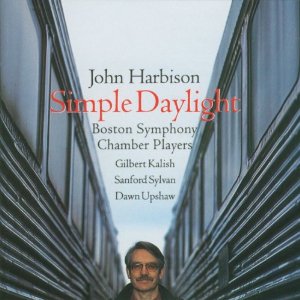 JH: It probably helps
because it speeds up that thing we were just talking about, the waiting
period that helps performers to absorb. There are problems about
the whole issue of composer-supervised recordings, not unrelated to the
problems in the accounts of historic performances.
JH: It probably helps
because it speeds up that thing we were just talking about, the waiting
period that helps performers to absorb. There are problems about
the whole issue of composer-supervised recordings, not unrelated to the
problems in the accounts of historic performances.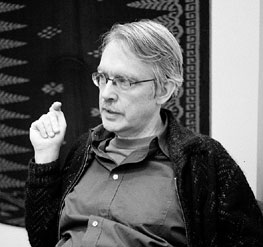 BD: Do you have any
advice for the audience that will come to hear pieces of your music, or
other composers' music?
BD: Do you have any
advice for the audience that will come to hear pieces of your music, or
other composers' music?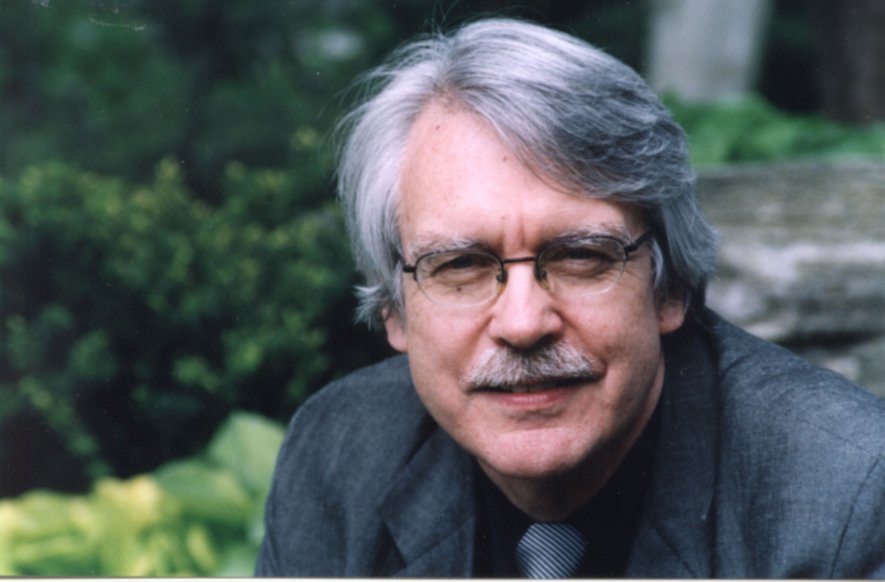
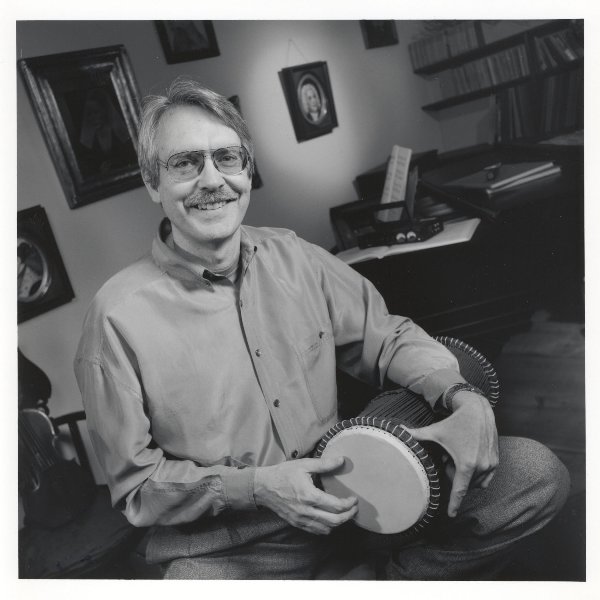 JH: Yes, and it's
mysterious as to what's going on. I often wish I could learn
something from this and be able to anticipate, particularly because I'm
always trying to plan how long it's going to take to write a
piece. For just the general labor involved, it would be nice to
predict, and I can't. I get into trouble sometimes where I don't
really expect to. Sometimes I think I've got a great notion about
a piece, which in practice turns out not to be. Then you have to
be able to retool.
JH: Yes, and it's
mysterious as to what's going on. I often wish I could learn
something from this and be able to anticipate, particularly because I'm
always trying to plan how long it's going to take to write a
piece. For just the general labor involved, it would be nice to
predict, and I can't. I get into trouble sometimes where I don't
really expect to. Sometimes I think I've got a great notion about
a piece, which in practice turns out not to be. Then you have to
be able to retool. | Composer
John Harbison
is among America's most prominent artistic
figures. He has received numerous awards and distinctions, including
three of the most prestigious: the MacArthur Foundation's "genius"
award, the Pulitzer Prize, and the Heinz Award in the Arts and
Humanities. Harbison has composed music for most of this country’s
premiere musical institutions, including the Metropolitan Opera (for
whom he wrote The Great Gatsby), the Chicago Lyric Opera, the
New York Philharmonic, the Chicago Symphony, the Boston Symphony, the
Los Angeles Philharmonic, the Chamber Music Society of Lincoln Center,
and the Santa Fe and Aspen festivals. His works include four string
quartets, five symphonies, a ballet, three operas, and numerous chamber
and choral works. Harbison's music is distinguished by its exceptional resourcefulness and expressive range. He is considered to be "original, varied, and absorbing — relatively easy for audiences to grasp and yet formal and complex enough to hold our interest through repeated hearings — his style boasts both lucidity and logic" (Fanfare). Harbison is also a gifted commentator on the art and craft of composition and was recognized in his student years as an outstanding poet (he wrote his own libretto for Gatsby). Several works have recently premiered: Double Concerto for Violin and Cello with the Boston Symphony Orchestra; Diamond Watch: Double Play for Two Pianos (at MIT), Leonard Stein Anagrams (for Piano Spheres), Mary Lou (for the Pittsburgh Youth Symphony), The Seven Ages (A Koussevitsky commission for the New York New Music Ensemble and the San Francisco Contemporary Music Players), French Horn Suite (Boston, MA), A Clear Midnight (Pro Arte Singers), Winter's Tale (BMOP, complete revised version), Symphony No. 5, commissioned by the Boston Symphony Orchestra; The Great Gatsby Suite (for the Aspen Festival Orchestra), Cortège, for six percussionists (New England Conservatory); Milosz Songs (commissioned by the New York Philharmonic for long-time Harbison champion Dawn Upshaw); the Concerto for Bass Viol (commissioned by the International Society for Double Bassists for a consortium of fifteen major orchestras); But Mary Stood: Sacred Symphony for Soprano, Chorus and Strings (Cantata Singers of Boston); and the sinfonietta Umbrian Landscape (Chicago Chamber Musicians) Harbison's present composition projects include a setting of texts by Alice Munro for voice and orchestra (for the Metropolitan Opera Orchestra), his Sixth Symphony for the Boston Symphony Orchestra (who are also honoring Harbison by presenting his full symphonic cycle between 2010-2012), his fifth string quartet (for the Pro Arte Quartet), and a work for violin and piano (Music Accord). Harbison’s opera Full Moon in March (BMOP Sound) was released on CD in April 2009 and The First Four String Quartets (Centaur) was released in September, joining several new recordings issued last season: Christmas Vespers (Brassjar Music), Montale Occasions (Albany), and the ballet UlyssesThe Rewaking (String Quartet with Soprano, Bridge); Partita (American Orchestral Works, Cedille), nominated for a Grammy Award; John Harbison: Chamber Music (Naxos); Music of John Harbison, Volume 1 (Bridge); The Amelia Trio: Music of John HarbisonMotetti di Montale (Koch), also a Grammy nominee; Symphony No. 3 (Oehms Classics: Levine/Munich); String Quartet No. 4 (Koch); the Viola Concerto (Albany); the Cello Concerto (Albany); Four Psalms and Emerson (New World); and Variations, Four Songs of Solitude, and Twilight MusicThe New York Times. Harbison has been composer-in-residence with the Pittsburgh Symphony, the Los Angeles Philharmonic, the Tanglewood, Marlboro, and Santa Fe Chamber Music Festivals, Songfest, and the American Academy in Rome. As a conductor, Harbison has led a number of leading orchestras and chamber groups. From 1990 to 1992 he was Creative Chair with the St. Paul Chamber Orchestra, conducting music from Monteverdi to the present, and in 1991, at the Ojai Festival, he led the Scottish Chamber Orchestra. Harbison has also conducted many other ensembles, among them the Los Angeles Philharmonic, the Boston Symphony, and the Handel and Haydn Society. Mr. Harbison first led Bach cantata performances in 1958 as conductor of Harvard’s Bach Society Orchestra. He has continued to do so every year since then, in two tenures as music director of Boston’s Cantata Singers, and then for many years as principal guest conductor of Emmanuel Music in Boston, leading performances there not only of Bach cantatas, but also 17th-century motets, and contemporary music. Harbison was born in Orange, New Jersey on December 20, 1938 into a musical family. He was improvising on the piano by five years of age and started a jazz band at age 12. He did his undergraduate work at Harvard University and earned an MFA from Princeton University. Following completion of a junior fellowship at Harvard, Harbison joined the faculty at the Massachusetts Institute of Technology where, in 1984, he was named Class of 1949 Professor of Music; in 1994, Killian Award Lecturer in recognition of "extraordinary professional accomplishments;"and in 1995 he was named Institute Professor, the highest academic distinction MIT offers to resident faculty. He has also taught at CalArts and Boston University, and in 1991 he was the Mary Biddle Duke Lecturer in Music at Duke University. Furthering the work of younger composers is one of Harbison's prime interests, and he serves as president of the Aaron Copland Fund for Music. In 1998, Harbison was named winner of the Heinz Award for the Arts and Humanities, a prize established in honor of the late Senator John Heinz by his wife Teresa to recognize five leaders annually for significant and sustained contributions in the Arts and Humanities, the Environment, the Human Condition, Public Policy and Technology, and the Economy and Employment. He is the recipient of numerous other awards, among them the Distinguished Composer award from the American Composer's Orchestra (2002), the Harvard Arts Medal (2000), the American Music Center's Letter of Distinction (2000), the Kennedy Center Friedheim First Prize (for his Piano Concerto), a MacArthur Fellowship (1989), and the Pulitzer Prize (1987). He also holds four honorary doctorates. Much of Harbison’s violin music has been composed for his wife Rose Mary, with whom he serves as artistic director of the annual Token Creek Chamber Music Festival, founded in 1989 and held on the family farm in Wisconsin, where much of Harbison’s music has been composed. In recent years, Harbison has revived his career as a jazz pianist, composer, and arranger. Early on, as the founder-leader of the Harbison Heptet and as sideman in many other groups — playing with Tom Artin, Buck Clayton, Vic Dickenson, Jo Jones, and Edmund Hall (1952-1963) — he took a jazz sabbatical for four decades, returning in 2003 to found the Token Creek Jazz Ensemble. The quartet and guests perform exclusively for the annual Token Creek Festival in Wisconsin. As a keyboard player he explores affinities between jazz change playing and figured bass realization. Harbison’s music is published exclusively by Associated Music Publishers. — September
2010
|
This interview was recorded in Chicago on June 13,
1991.
Portions (along with recordings)
were used on WNIB in 1993 and 1998, on WNUR in 2006, and on
Contemporary Classical Internet Radio in 2007 and 2009. This
transcription was made and posted on this
website in 2011.
To see a full list (with links) of interviews which have been transcribed and posted on this website, click here.
Award - winning broadcaster Bruce Duffie was with WNIB, Classical 97 in Chicago from 1975 until its final moment as a classical station in February of 2001. His interviews have also appeared in various magazines and journals since 1980, and he now continues his broadcast series on WNUR-FM, as well as on Contemporary Classical Internet Radio.
You are invited to visit his website for more information about his work, including selected transcripts of other interviews, plus a full list of his guests. He would also like to call your attention to the photos and information about his grandfather, who was a pioneer in the automotive field more than a century ago. You may also send him E-Mail with comments, questions and suggestions.